The Narrations in Question
There are narrations within Sahih Bukhari, Sunan An-Nasa’i and others where the Prophet allegedly says the following:
Ibn ‘Abbas said:
“The Messenger of Allah [ﷺ] said: ‘Whoever changes his religion, kill him.'” (Sunan An-Nasa’i 4059)
Narrated `Ikrima:
`Ali burnt some people and this news reached Ibn `Abbas, who said, “Had I been in his place I would not have burnt them, as the Prophet (ﷺ) said, ‘Don’t punish (anybody) with Allah’s Punishment.’ No doubt, I would have killed them, for the Prophet (ﷺ) said, ‘If somebody (a Muslim) discards his religion, kill him.’ ” (Sahih Bukhari 3017)
Diagramming the Isnads
When we diagram the isnads for this narration, we find something extremely interesting. We have a man named Ikrima (slave of Ibn Abbas) as the individual responsible for the narrations. We have four separate strands through Qatada, but it appears that Qatada fabricated where he received some of these narrations to conceal the fact he received it from Ikrima. He manages to show he received it from Ikrima once, which is a strong indication that the three others Qatada received it from was also Ikrima, not Anas b. Malik or Hasan Al-Basri.
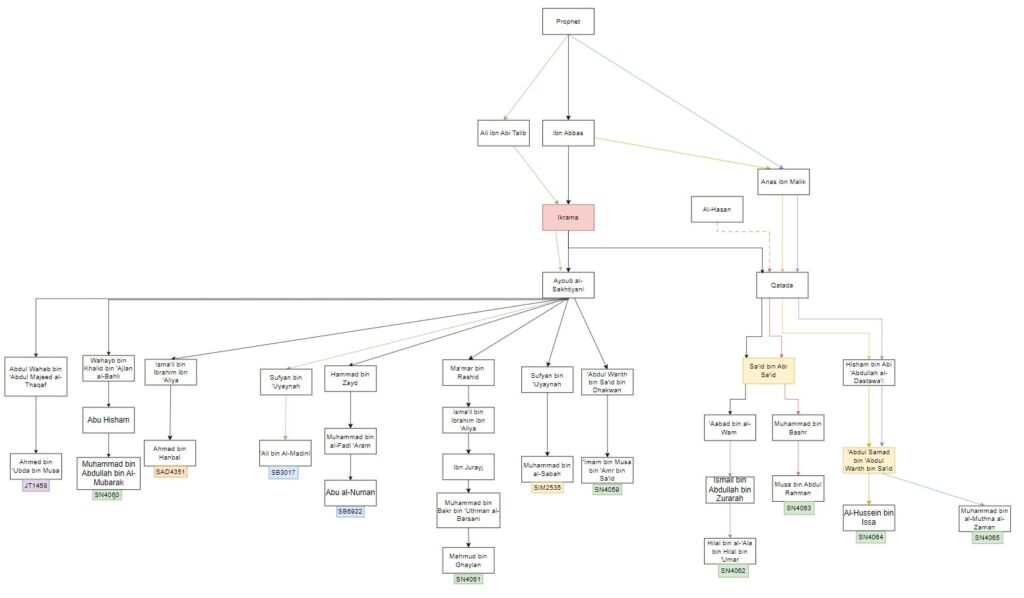
Another interesting point about these narrations, is that we do not see these narrations about Ibn Abbas declaring apostasy as a death penalty in Sahih Muslim or in the Muwatta of Imam Malik (the earliest collection of Hadith). Considering that apostasy death is a matter of jurisprudence, Imam Malik would have picked it up in his Muwatta but it was completely missing from it.
The Perception of Ikrima By Others
A lot of the sources listed below consider Ikrima to be a Khawaraji (or of their opinions). The Khawarij were one of the first splinter groups of Islam. They were the group that supported Ali b. Abi Talib, but soon after rebelled against him after he decided to compromise with Mu’awiya b. Abi Sufyan in 657. It is claimed that Ali defeated the Khawarij in a major battle, but soon after a dissident from amongst the Khawarij came back to Ali and assassinated him. They are typically described as an extremely violent sect. This is the group that many have accused Ikrima of being apart of.
It’s noted by scholars like Imam Dhababi that not everyone viewed Ikrima as a legitimate narrator of hadith (or at least up to par with other hadith narrators).
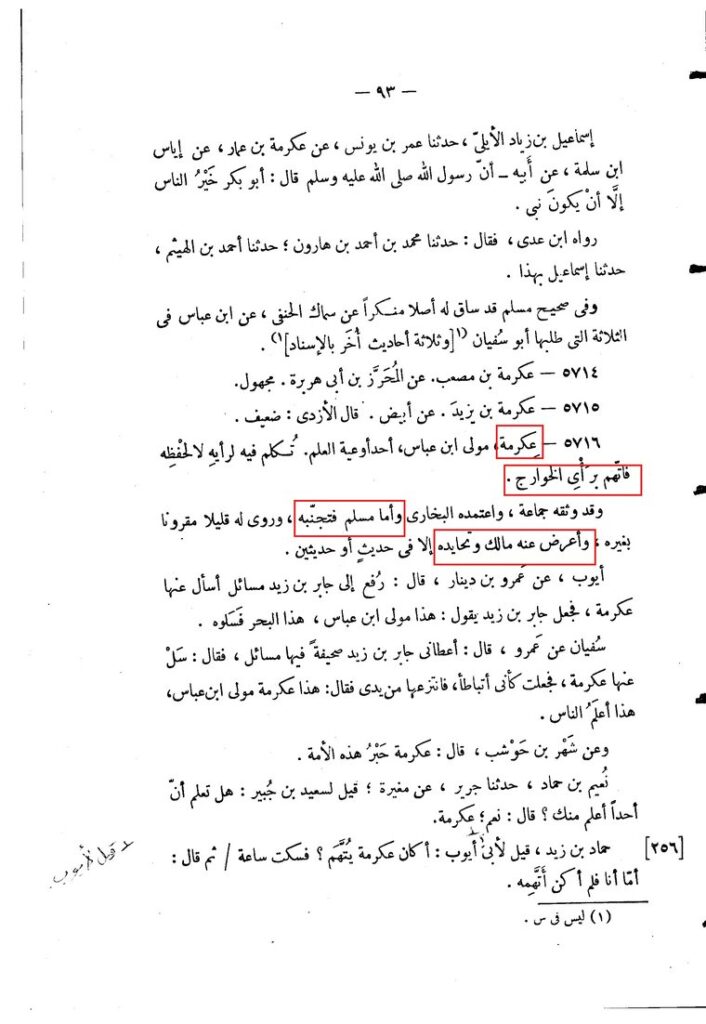
‘You talk to him in his opinions not his preservations capabilities, he was accused of being khawaraji’
‘The group [The jamaha, ie, the jamah from Sunnah and the jamaha] trusted him, Bukhari relied on it [Ikrima], Muslim avoided it [Ikrima], and narrated a little of it. Malik [b. Anas] turned away and took him in only one or two hadiths.’
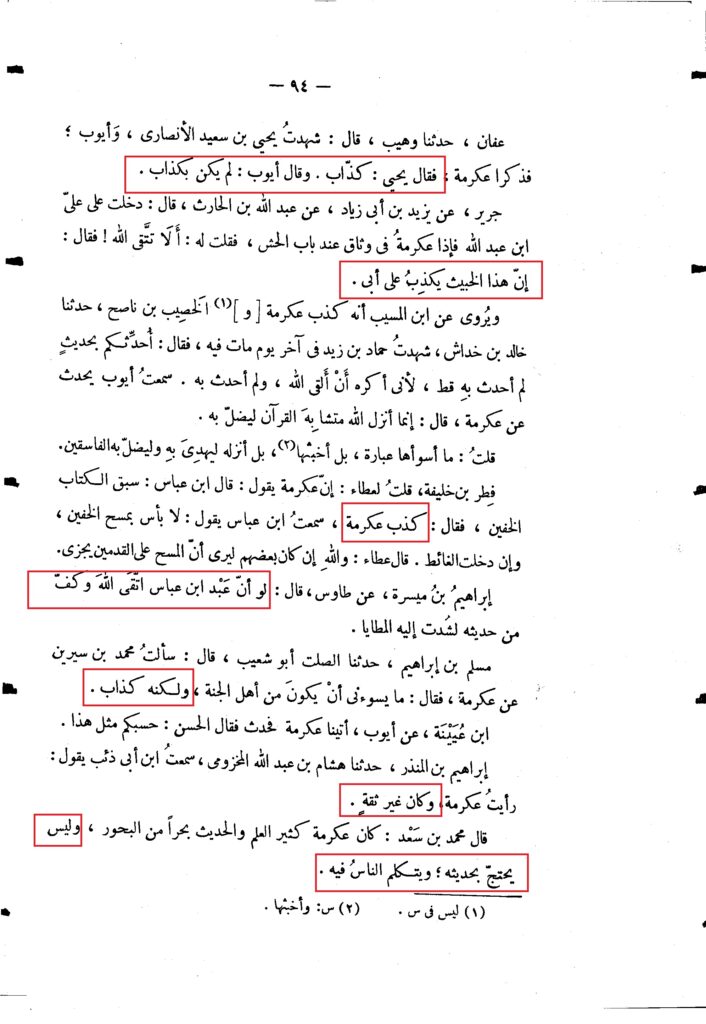
‘They mentioned Ikrima, and Yahya said: He is a liar.
Jabir, from yazid ben abi zyad, from AbdAllah ben hareth, he said: I came into Ali bin AbdAllah, and he found Ikrama tied to the garden door, and I said, do you not fear Allah! He said, he is filthy [very derogatory] he lies on abi ali.
I hear abu ayoob narrate from Ikrama, he said Allah sent confusion Quran to mislead people. [translator’s notes: !!!!!!!!]
Ayoub said: He was not a liar.’
‘This malicious person [Ikrima] is lying to my father’.
‘I asked Muhammad b. Sirin Muslim b. Ibrahim about Ikrima, and he said: It is not bad for me that he is amongst the people of Paradise, but he is a liar.’
‘Ibrahim b. Al-Mundhir, Hisham b. AbdAllah Al-Makhzoumi told us, I head ibn Abi Dhi’b say: I saw Ikrima and he was not trustworthy.’
I asked Mohamed b. Sirin about Ikrama and he said it wouldn’t harm me for him to be from the people of paradise but he is a liar.
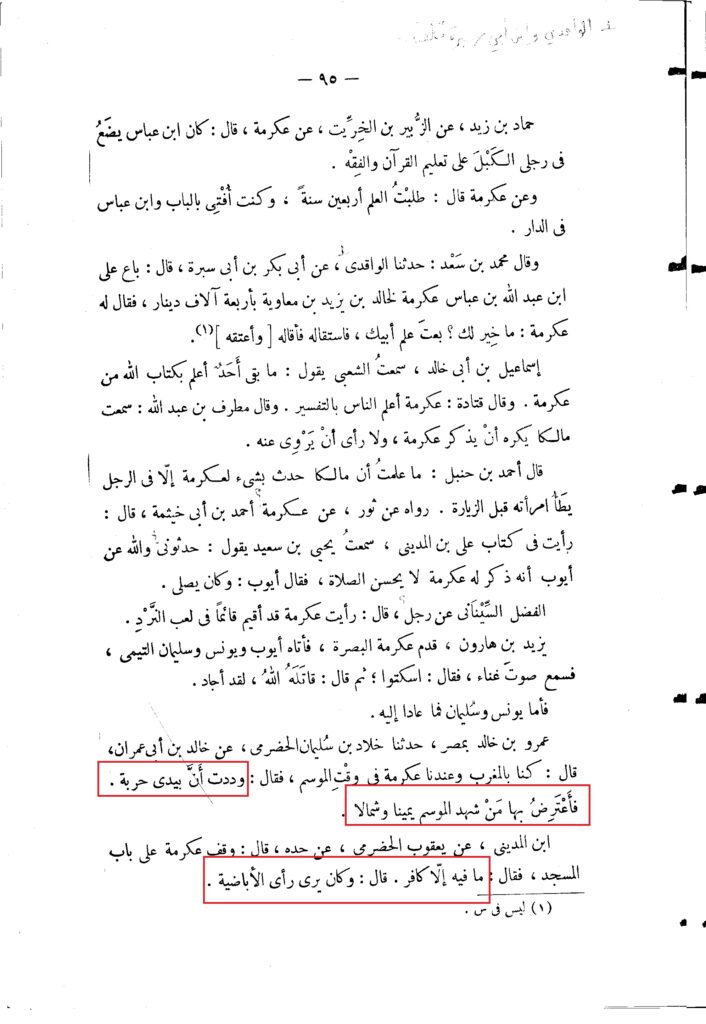
I head Malik hated the mentioning of Ikrama and did not narrate from him.
Ikrama in the time of the season and he said: I wish I had a spear, I would, using it, stop anyone who witnesses the season, left and right. [I’m assuming the season is the season of hajj]
Al Fadl Sainai from Rajol, said: I saw Ikrama playing dice. Yazid b. Harun, presented Ikrama to al-basra, then Ayub and Younes and Soleiman al-taymi came and he heard singing, and said: shut up, then said [and I’m paraphrasing here] Goddamnit, he knows how to sing. [another translation: Allah kills him, he’s good]
‘Ikrima stood at the door of the mosque and said: There is nothing in it except a disbeliever. He said: And he was of the opinion of the Ibadi that there is nothing wrong with it,’
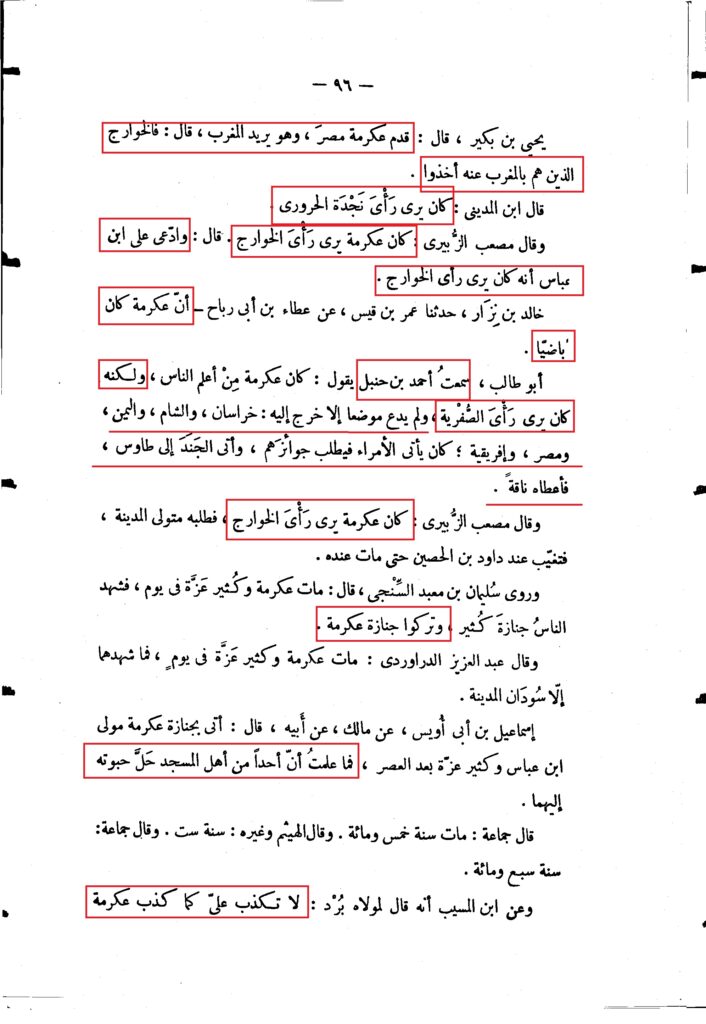
Yahya b. Bakr, said: Ikrama came to Egypt, heading to morocco, and said: The khawariji in Morocco are inspired by him [Ikrama].
Khaled b. Nizar, told us Umar b. kays, from Ataa b. Abi Rabah – Ikrama was Ibadi
Al-Zubairi said: Ikrima used to see the opinion of the Khawarijites. He said: He claimed Ibn Abbas was of the same opinions the Khawarijites.
Abu Bakr and the Ridda Wars (The Wars of Apostasy)
After the death of the Prophet Muhammad, there was a quarrel within the community as to who would lead. The Medinans wanted someone from amongst themselves (which led to fabricated counter-hadith that claimed the caliphate must come from Quraish), Abu Bakr and Umar b. Al-Khattab wanted someone from amongst the companions, and Ali b. Abi Talib had followers that wanted him to be the successor. After intense turmoil, fights, and compromises, Abu Bakr became the caliph. As soon as the news of the Prophet’s death reached outer Arabia, the tribes that had converted to Islam during the lifetime of the Prophet had now revolted and became apostates.
Abu Bakr re-conquered all of Arabia, but if Ikrima’s narration of killing apostates were truly statements of Ibn Abbas, and the Prophet, then we would have seen Abu Bakr-death squads all over Arabia for the tribes leaving the religion.
Quran’s Stance on Apostasy and Killing Others
[88:21] You shall remind, for your mission is to deliver this reminder.
[88:22] You have no power over them.
[88:23] As for those who turn away and disbelieve.
[88:24] GOD will commit them to the great retribution.
Reflections
It looks like Ikrima is the one responsible for these narrations, with Qatada concealing where he received his original narrations whenever he doesn’t cite Ikrima. Some compilers (Malik b. Anas, Muslim b. Hajjaj) refused to carry this narration considering their views of Ikrima. We don’t see these narrations in the earliest hadith books. The Quran is clear in its stance against killing people unjustly. There are numerous verses about punishments for disbelief, but all of those punishments are reserved for the afterlife. There is no worldly punishment for apostasy.
Video:

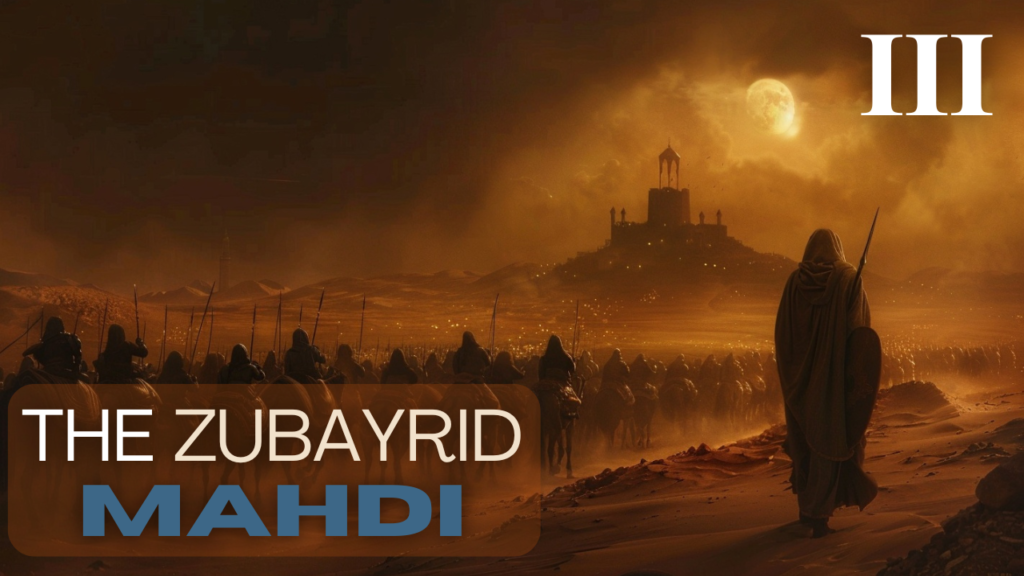
Pingback: ʿIlm al-Rijāl (علم الرجال) - A Case Study Of This Flawed Science - hadithcriticblog.com
Pingback: The Origin of Islamic Apostasy: The Slave of Ibn Abbas - HadithCritic